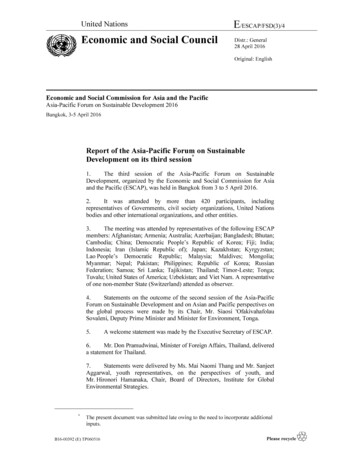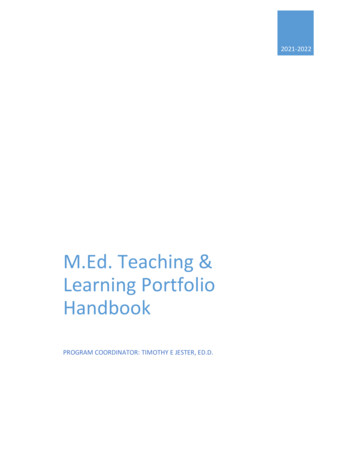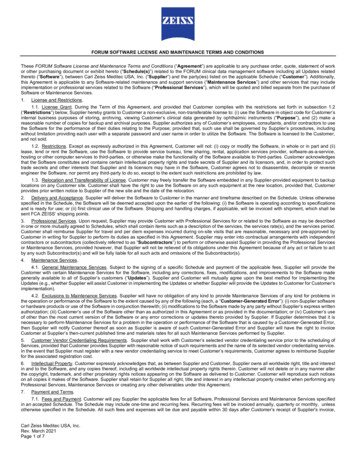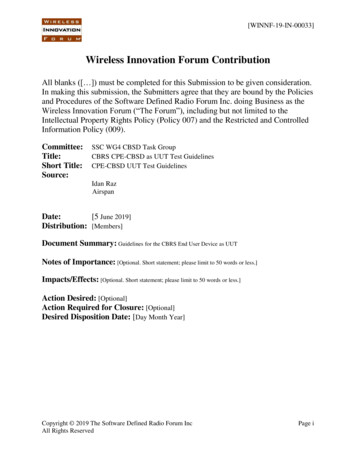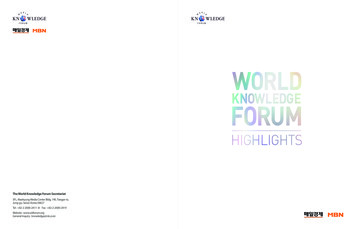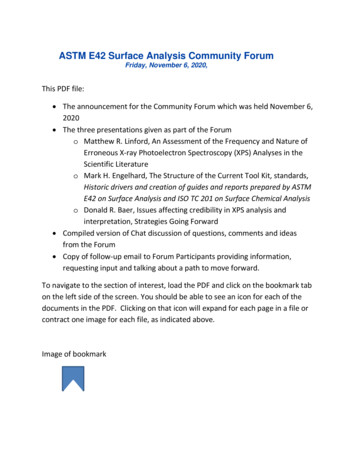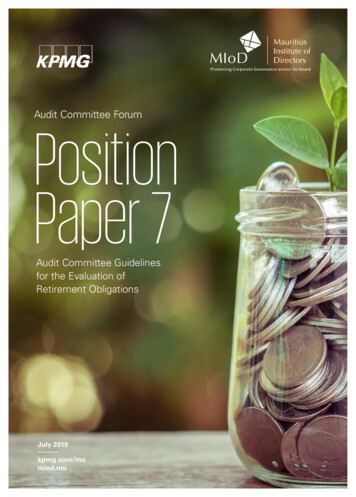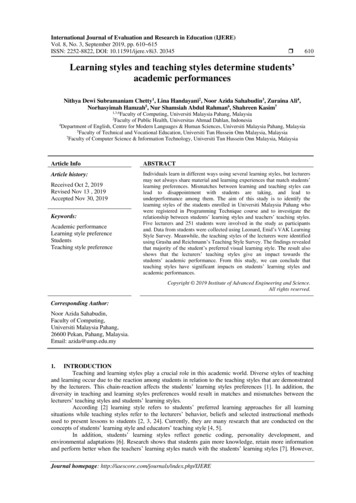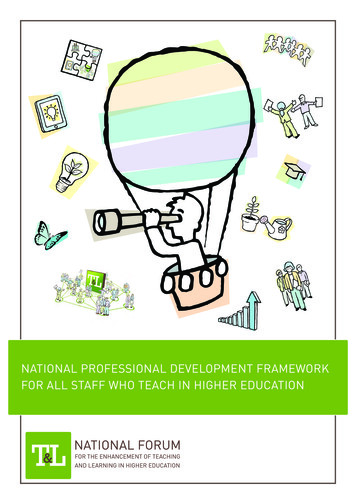
Transcription
NATIONAL PROFESSIONAL DEVELOPMENT FRAMEWORKFOR ALL STAFF WHO TEACH IN HIGHER EDUCATIONNATIONAL FORUMFOR THE ENHANCEMENT OF TEACHINGAND LEARNING IN HIGHER EDUCATION
NATIONAL PROFESSIONAL DEVELOPMENT FRAMEWORK FOR ALL STAFF WHO TEACH IN HIGHER EDUCATIONNational Professional Development Framework forAll Staff Who Teach in Higher Educationi
NATIONAL FORUM FOR THE ENHANCEMENT OF TEACHING AND LEARNING IN HIGHER EDUCATIONPublished by:National Forum for the Enhancement of Teaching and Learning in Higher Educationc/o 19 Dawson Street, Dublin 2, IrelandT: 353 1 6090648Email admin@ teachingandlearning.ieWeb: www.teachingandlearning.ieAugust 2016ii
NATIONAL PROFESSIONAL DEVELOPMENT FRAMEWORK FOR ALL STAFF WHO TEACH IN HIGHER EDUCATIONIntroduction and AimsThis document describes the newly articulated National Professional Development Framework for all staffwho teach1 in Irish higher education. The framework provides guidance for the professional development(PD) of individuals and gives direction to other stakeholders (e.g. institutions, higher education networks,educational/academic developers, policy makers and student body representatives) for planning, developingand engaging in professional development activities.This PD framework aims to: Empower staff to create, discover and engage in meaningful personal and professional developmentin a variety of ways Encourage staff to engage in peer dialogue and support in their professional development activities Enhance and develop the pedagogy of individual disciplines2 for relevance and authenticity and enablelearning from other disciplines Assist staff to reflect on, plan and contribute to the evidence-based3 enhancement andtransformation of their teaching and learning approaches Contribute to the quality assurance and enhancement of the student learning experienceThe PD framework is flexible, inclusive and can be interpreted and adapted for: academic staff acrossdisciplines; educational/learning technologists; educational/academic developers; research staff; library staff;support staff and students who teach others e.g., graduate teaching assistants and those who engage inpeer assisted learning.The importance of the local context within which teaching takes place is also fully recognised. Thisframework is designed to be interpreted in a way that reflects the local priorities within which each individualoperates. Although the focus is on individual staff, the framework does not preclude its use by teams orgroups of staff for group-based professional development.The framework is underpinned by a number of identified values i.e. inclusivity, authenticity, scholarship,learner-centredness and collaboration (Appendix 1). These values act as a guide for individual staff, academicdepartments and institutions to recognise, inform, enhance and sustain professional development.Typology of Professional Development ActivitiesThe typology of the professional development opportunities incorporated in the framework includes activitieswhich are non-accredited (including collaborative, unstructured and structured) and those which areaccredited (Table 1).123‘Teach’ used in this document is inclusive of all the activities involved in the teaching and the facilitation of student learning. The termincorporates the principles of student engagement in the learning process.Discipline is used in this framework to encompass the individual’s discipline or subject, however it is also used to include otherprofessional groups (i.e. educational developers, educational/learning technologists).‘Evidence-based’ refers to any concept or strategy that is derived from or informed by trustworthy evidence—most commonly,educational research or metrics of school, teacher, and student performance.1
NATIONAL FORUM FOR THE ENHANCEMENT OF TEACHING AND LEARNING IN HIGHER EDUCATIONTable 1: Typology of Professional Development ActivitiesNon-Accredited3. StructuredNon-accredited(non-formal)4. AccreditedLearning from theseThese activities areactivities comes fromindependently led by thetheir collaborative nature individual. Engagement isdriven by the individual’sneeds/interests.Individuals source thematerial themselvesOrganised activities (byan institution, network ordisciplinary membershipbody). They are typicallyfacilitated and haveidentified learningobjectivesAccredited programmesof study (ECTS or similarcredits)Examples –Conversations withcolleagues, peernetworking, peerobservations, onlineblogs/discussion forumsExamples - Workshops,seminars, MOOCs,conferences, summerschools, structuredcollaborative projectsExamples - ProfessionalCertificate, GraduateDiploma, Masters, PhD,EdD in: Teaching andLearning, eLearning,Leadership in Education;Education Policy1. CollaborativeNon-accredited(informal)42. UnstructuredNon-accredited(non-formal) 4Examples - Readingarticles, following socialmedia, self-study,watching video tutorials,keeping a reflectiveteaching journal/portfolio,preparing an article forpublication(formal)4Types of LearningStaff who teach develop their knowledge, skills and competencies in their teaching through a rangeof learning activities. Each learning activity can be described by different types of learning, singly orin combination. The framework identifies and recognises four types of learning associated with anyprofessional development learning activity (‘new learning’, ‘consolidating learning’, ‘mentoring’ and ngNew LearningActivityFigure 1: Types of learning42Informal learning is defined as non-conscious learning, it is not measured against a construct, and there are no criteria forprogression. There may be a learning objective but there is no judgement or evaluation.Non-formal learning is always organised, structured and engaged in consciously. There may be a learning objective but there is nojudgement or evaluation.Formal learning is always organised, structured and engaged in consciously, it has clear learning objectives and is judged andevaluated for recognised credit.
NATIONAL PROFESSIONAL DEVELOPMENT FRAMEWORK FOR ALL STAFF WHO TEACH IN HIGHER EDUCATIONThe Domains of the FrameworkThe framework incorporates five overarching domains, each expanded through a series of elements. Theuniqueness that each individual brings to their teaching is acknowledged by placing ‘the self’ (Domain 1:Personal Development) at the centre of all professional development activity (Figure 2).ning ScholarshipLear&ghinaceTThe SelfProfessionalCommunicationand Dialoguersg Schola hiprninLeaPersonal andProfessionalDigital Capacityg&hinacTeProfessionalIdentity, Values,and DevelopmentProfessionalKnowledge andSkillsFigure 2: The domains, underpinned by the framework’s values.The domains and their elements provide a framework to guide staff to review their current knowledge, skillsand competencies, regardless of how, where or when these dimensions of professional learning have beendeveloped. There is also a focus on supporting people to plan for their future professional developmentneeds with these domains in mind. These can also can be used by institutions nationally to support theprovision of professional development opportunities for those who teach in higher education.All five domains refer to the activities that staff engage in as part of their teaching (including assessmentand feedback activity) and the impact that these have on their students’ learning. The development of anindividual’s engagement with the scholarship of teaching and learning5 is an integral component of eachdomain.5In the context of the professional development framework, the scholarship of teaching and learning entails a process of enquirywhere staff reflect on their own teaching practice, gather evidence of learning impact and share their experiences with peers and/orpublic, so they and others may learn from the findings.3
NATIONAL FORUM FOR THE ENHANCEMENT OF TEACHING AND LEARNING IN HIGHER EDUCATIONDomain 1:Personal Development: The ‘Self’ in Teaching and LearningDescriptionThis domain emphasises the personal values, perspectives and emotions that individuals bring to theirteaching, including self-awareness, confidence, life experience and the affective aspects associated withteaching. It makes transparent the importance of the personal values that underpin any human interaction,especially those needed for authentic, engaged teaching and how these values are impacted by the workcontext. In addition, this domain encourages the exploration of the positive and negative emotions andpersonal characteristics that impact on teaching, e.g. confidence, enthusiasm, commitment, anxiety andfrustration. This domain plays an important role in helping staff to understand and declare their teachingphilosophy and approach. It recognises the importance of personal wellbeing and the significant impact thishas on individual teaching and learning roles.Domain 1: Elements1.1 Identification of and reflection on the key personal characteristics (values, perspectives and emotions)that motivate and challenge teaching, and their impact on student learning and the scholarship ofteaching and learning.1.2 Reflection on prior learning and life experiences that contribute, or are barriers, to teaching, i.e. priorexperience and knowledge: as a student, as a teacher, as a researcher and in life.1.3 Articulation of a personal philosophy of and approach to teaching.1.4 Reflection on the impact of current working context on self.1.5 Awareness of the extent to which personal philosophy aligns with or confronts current institutional,national and international context and associated values.Domain 2:Professional Identity, Values and Development in Teachingand LearningDescriptionThis domain emphasises the importance of the development and self-evaluation of professional/disciplinaryidentity and its associated roles, responsibilities and action plans. It encourages staff to consider theirprofessional and/or disciplinary identity in their context (for example, an academic staff member, aneducational technologist, learning support staff who teach, etc.) at a particular point in time. This domainsupports the development of staff’s critical reflection skills and the evaluation of their teaching. In particular,it emphasises the importance of the development of the scholarship of teaching and learning. Some keyprofessional values are identified. The importance of planning for professional development activities ininstitutional or other contexts is also highlighted as part of this domain.4
NATIONAL PROFESSIONAL DEVELOPMENT FRAMEWORK FOR ALL STAFF WHO TEACH IN HIGHER EDUCATIONDomain 2: Elements2.1 Articulation of a professional/disciplinary identity, including current roles and responsibilities,and identification of unique features of current roles and responsibilities that potentially impacton teaching and learning practices, e.g. external examining, industry liaison, outreach activities,technological competence, information literacy development.2.2 Evaluation of teaching and impact on student learning, based on self/peer review/peer observation,student feedback and/or other evidence.2.3 Awareness of and contribution to the scholarship of teaching and learning, through sharing ofpractice, developing evidence-based approaches, research into, dissemination and/or application ofresearch on teaching and learning.2.4 Enactment of the values underpinning professional development and consideration of; respect forindividuals and groups of diverse learners and staff; awareness of and promotion of ethical values andbehaviour; promotion of participation of student learners; advancement and advocacy of discipline;sharing of resources; developing collegiality; identifying unconscious gender bias; commitment toreflective and evidence-based practice and citizenship (contributing to the institution/society’s ethicaland civic purpose).2.5 Development and monitoring of an evidence-based, reflective professional development learning planfor their context.Domain 3:Professional Communication and Dialogue in Teachingand LearningDescriptionAt the core of this domain is the importance of the excellent, clear and coherent communication skillsrequired for the changing learning environment. It emphasises the key skills of written/verbal/visualcommunication, listening, dialogue and collaboration with others in the professional learning process. Itrecognises the importance of teaching and learning in a community to enhance student learning. The socialdimension of professional learning is emphasised, and it recognises the role that communities of practiceand networks play in supporting this locally, nationally and internationally; and within and across disciplines.Domain 3: Elements3.1 Commitment to ensuring excellence, clarity, coherence and precision in all forms of communication.3.2 Development of academic and other forms of writing and enquiry skills to enhance both one’sown and students’ learning, i.e. academic writing (journal articles, written feedback on studentassignments and performance, reports, policy/procedures); general professional communicationskills (email, social media) and technical communication skills (curriculum/module descriptions, exam/assessment instructions, reports and proposals).5
NATIONAL FORUM FOR THE ENHANCEMENT OF TEACHING AND LEARNING IN HIGHER EDUCATION3.3 Development of engaging verbal and non-verbal communication (formal and informal) and listeningskills required for different situations and environments (with/to students, with teams, acrossinstitutions, with peers and with media, industry and the public).3.4 Development of peer, group and team-working skills for the enhancement of teaching, learning andscholarship, e.g. curriculum team discussion, on-line forums/communities on teaching and learning,constructive peer review of teaching/research, team-teaching.3.5 Commitment to the development of communicative learning communities with peers/colleagues(disciplinary and interdisciplinary).3.6 Exploration of and engagement in dialogue with international and national communities/partners toenhance teaching.Domain 4:Professional Knowledge and Skills in Teaching and LearningDescriptionThis domain emphasises the importance of both disciplinary knowledge and disciplinary approaches toteaching (disciplinary pedagogies), while also drawing on inter-disciplinary experiences and approaches. Itsupports an active student role in the learning process, moving toward a partnership in the teaching andlearning process, essential in the higher education environment. It incorporates staff’s capacity to designand implement innovative and creative teaching and learning approaches at different levels of curriculum. Theimportance of assessment and feedback is emphasised, in particular the move to a more learner-orientedand dialogic feedback approach for students and balance in the assessment of/for/as learning. The role ofunderpinning theories of learning and staff’s knowledge and contribution to teaching and learning policies,procedures and scholarship is also highlighted.Domain 4: Elements4.1 Relevance and currency of disciplinary/subject knowledge, e.g. through research, literaturesearches, dialogue with peers, industry/placement experiences, industry projects, professional bodymemberships, etc.4.2 Supportive of active student-centred approaches to learning that engage students and build towardsstudents as partners in their learning.4.3 Design and management of sessions, modules and/or curricula (programmes) appropriate to thelearning environment.4.4 Development and application of appropriate teaching and learning approaches and specialistskills from one’s own discipline and other disciplines that support the development of students’knowledge, their skills of enquiry and other stated institutional/professional body graduate attributes(e.g. critical thinking, creative, entrepreneurial, responsible, collaborative, etc.).6
NATIONAL PROFESSIONAL DEVELOPMENT FRAMEWORK FOR ALL STAFF WHO TEACH IN HIGHER EDUCATION4.5 Application of appropriately aligned assessment and learner-oriented feedback approaches from one’sown discipline and, where relevant, from other disciplines.4.6 Knowledge of and application of the theories of how students learn within and across disciplines, anda responsiveness to the needs of diverse cohorts of students.4.7 Exploration and application of inclusive, innovative, enquiry-based, problem-based and creativeapproaches to student learning.4.8 Knowledge of and contribution to relevant teaching and learning policies and procedures in local,national and international higher education contexts.Domain 5:Personal and Professional Digital Capacity in Teaching and LearningDescriptionThis domain emphasises the importance of personal and professional digital capacity and the application ofdigital skills and knowledge to professional practice. The domain focuses on the development of personalconfidence in digital skills to develop professional competence and the identification of opportunities fortechnology to support and enhance student learning. This domain is underpinned by the National DigitalSkills Framework for Education.Domain 5: Elements5.1 Awareness of the key digital aspects and opportunities on the higher education landscape andadoption of an evidenced-based approach to the application of technology in the design of learning forstudents (Teach and Learn)5.2 Application of educational and day-to-day tools and resources to support personal learning, teachingand scholarship (Tools and Technologies)5.3 Application of technologies for effective communication and collaboration with student, professionaland social communities (Communication and Collaboration)5.4 Use of digital tools to create and develop new learning materials, embedding a range of media andinteractive resources (Create and Innovate)5.5 Application of digital search strategies, skills and knowledge of the issues around the sharing andcopyrights of digital resources (Find and Use)5.6 Consideration of personal and other’s wellbeing and awareness of the nature of online identity,data and information, and privacy and protection in ways that are ethical and respectful (Identity &Wellbeing).7
NATIONAL FORUM FOR THE ENHANCEMENT OF TEACHING AND LEARNING IN HIGHER EDUCATIONEvidence-based ReflectionAt its core, the framework is underpinned by both a reflective and an evidence-based approach. Guided byits values, types of learning and the domains (listed), the framework assumes a cyclical, reflective process.The framework supports individuals in (a) reflecting on current knowledge and experience; (b) recognisingthe importance of self-evaluation informed by data and evidence; (c) identifying and developing a personalstrategy for effective use of relevant evidence; (d) developing their own capacity to shape and plan theirfuture learning (See Figure 3).Identify my key short and long termlearning goals, based on reflection andevidence.What do I do already or what have Iexperienced in the different elements ofeach domain?Consider external assessmentand/or certification of mylearning to date.Assessment/CertificationChoosing the evidenceto use.How will I store myevidence?Identify where I am currently,based on my self-reflection.Documentation/AssessmentWhat learning activities have ledto the development of suchknowledge and skillls?D Reflecting to identify,plan and prioritisefuture learning.External assessmentand/or certification oflearning to dateA Reflecting oncurrentknowledgeandexperienceC Reflecting on whatevidence to gatherand how to store it.Self -assessmentB Reflecting toself-evaluatebased onevidenceTakingstock/IdentificationReflecting on thelearning activities.What types of learningare associated with each ofthe learning activitiesidenitifed?What kind of evidence could Iprovide to support my evaluation?Identification/documentationUnderpinned by the PD framework’s values: inclusivity, authenticity, scholarship, learner-centrednessand collaborationFigure 3: Cycle of Evidence-based Reflection and Planning for Individual StaffThis document has articulated a professional development framework that is relevant to all those whoteach in Irish higher education. The framework brings together a range of disparate types of activity (manyof which are already long-established in the sector) and offers a single, coherent structure against whichindividual professional development can be mapped.For further information on the consultation process and the ongoing implementation of the professionaldevelopment framework across the higher education sector please visit www.teachingandlearning.ie.8
NATIONAL PROFESSIONAL DEVELOPMENT FRAMEWORK FOR ALL STAFF WHO TEACH IN HIGHER EDUCATIONAppendix 1: The Values6 underpinning the ProfessionalDevelopment sLearner-centerednessScholarshipValues underpinning the frameworkInclusivityThe approach is inclusive to all who teach in this sector, i.e. academic staff, education technologists/developers, teaching assistants, librarians who have a teaching role as part of their remit. It supports thelarge group of part-time teachers who are key contributors to the student learning experience and who maybe linked with more than one institution. It should allow for flexible pathways for different staff specialismsand changing work contexts. It should be sensitive to changes in staff roles and responsibilities, includingresearch, at all levels and stages of their careers.AuthenticityProfessional development should be authentic, in that it must allow for genuine and personally relevantengagement by participants. It should also be relevant to the individual within their discipline and to theinstitution(s) involved in their professional development. Approaches to teaching and learning in the disciplineare recognised and valued (the discipline pedagogy). The academic department has a strong role to play inthe enhancement and impact of meaningful personal and professional development of staff. The approachshould allow for substantial and impactful engagement. It should be authentic and should be manageable inthe time available.6These values emerged from the consultation process. Please see www.teachingandlearning.ie9
NATIONAL FORUM FOR THE ENHANCEMENT OF TEACHING AND LEARNING IN HIGHER EDUCATIONScholarshipThe approach is evidence-based and encourages staff to be informed on, knowledgeable about, and havethe capacity to contribute to the evidence base of their teaching. It encourages staff to link with establishedbest practices in professional development while also fostering innovation on the basis of evidence. Itemphasises the importance of teaching having an evidence base and supporting the scholarship of teachingand learning.Learner-centrednessThe approach supports both the staff member as a learner and the student as a learner, driven by theirvalues, needs and motivations. It emphasises the importance of the ‘self’ in learning. Professionaldevelopment should strongly align with an individual’s teaching practice and attempt to be transformativeof staff knowledge and skills. Reflective practice is a key lever for interrogating and transforming individualteaching practices over time and across contexts. An extension of this concept of (staff) learner-centrednesswas that of a student-centred approach to teaching. The approach should support innovative and creativeteaching and learning, which aims to improve student engagement and empowerment in their learning. Itshould support teaching, learning and assessment approaches that have the highest impact on students.CollaborationAlthough focused around the individual staff learner, the approach aims to emphasise the social learning thatis key to learning in the workplace context and supported by many learning theories. It should encouragestaff peer dialogue and support the mentoring of other staff. Although the approach emphasises the roleof individual institutions, it is important to build on existing inter-institutional activity for a more efficient andcollaborative approach to professional development. The approach strongly supports the development andrecognition of communities of practice that enhance professional learning in local, disciplinary or crossdisciplinary contexts.10
National Forum for the Enhancement of Teaching and Learningin Higher Educationc/o 19 Dawson StreetDublin 2T: 353 1 6090648info@teachingandlearning.ieDOI: 10.6084/m9.figshare.3803760.v1w w w. t e a c h i n g a n d le a r n i n g . i e
Leadership in Education; Education Policy Types of Learning Staff who teach develop their knowledge, skills and competencies in their teaching through a range of learning activities. Each learning activity can be described by different types of learning, singly or in combination.
